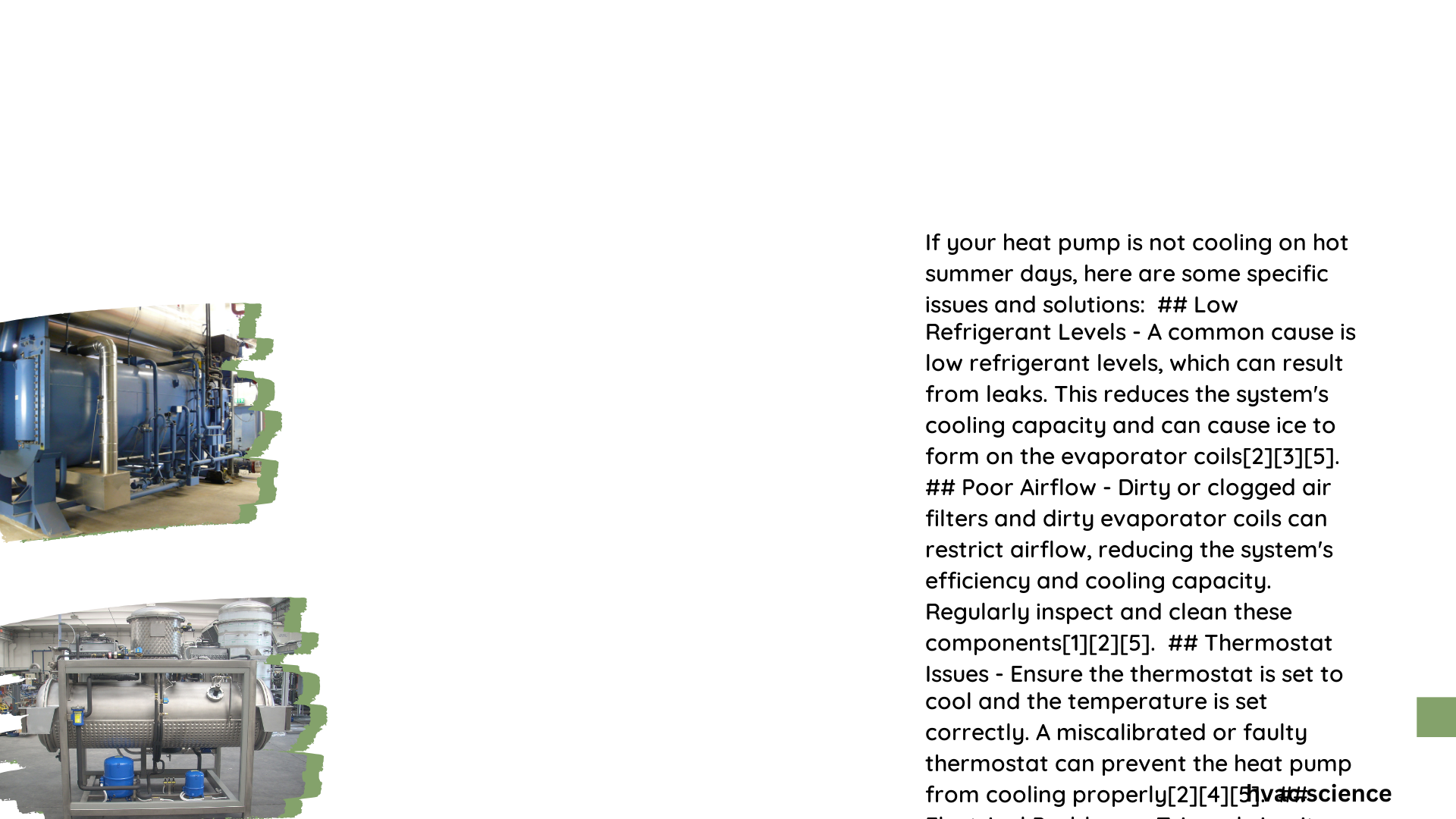Heat pumps not cooling effectively on hot summer days is a common issue faced by many homeowners. This problem can stem from various factors, including insufficient refrigerant, blocked air filters, malfunctioning components, or system inadequacies. Understanding these causes and implementing proper troubleshooting steps can help restore your heat pump’s cooling efficiency during peak summer temperatures.
Why Is My Heat Pump Not Cooling Properly in Hot Weather?
Heat pumps may struggle to cool effectively during hot summer days due to several reasons:
- Insufficient refrigerant
- Blocked or dirty air filters
- Malfunctioning reversing valve
- Thermostat issues
- Inadequate airflow
- Undersized system
Let’s explore each of these causes in detail:
What Role Does Refrigerant Play in Heat Pump Cooling?
Refrigerant is crucial for the heat pump’s cooling process. When refrigerant levels are low, the system’s pressure decreases, leading to:
- Reduced cooling efficiency
- Frozen coils
- Increased energy consumption
A properly charged heat pump should have refrigerant pressures within the manufacturer’s specified range. For R-410A, typical pressures during cooling operation are:
- Low side: 70-80 PSI
- High side: 150-200 PSI
How Do Dirty Air Filters Affect Heat Pump Performance?
Clogged air filters can significantly impair your heat pump’s cooling ability by:
- Restricting airflow
- Reducing the volume of air cooled
- Increasing energy consumption
To maintain optimal performance, replace air filters every 30-90 days, depending on usage and environmental factors.
What Happens When the Reversing Valve Malfunctions?
A faulty reversing valve can prevent the heat pump from switching between heating and cooling modes. This results in:
- Warm air being blown even when cooling is requested
- Inefficient operation
- Increased energy bills
Replacing a reversing valve typically costs between $500 to $1,500.
How Can I Troubleshoot My Heat Pump’s Cooling Issues?

To diagnose and resolve cooling problems with your heat pump, follow these steps:
- Check refrigerant levels
- Measure airflow rates
- Assess temperature differentials
What Are the Ideal Airflow Rates for Heat Pumps?
Proper airflow is essential for efficient heat pump operation. Use an anemometer to measure airflow rates:
| Cooling Capacity | Ideal Airflow Range |
|---|---|
| 1 ton | 300-600 CFM |
| 2 tons | 600-1200 CFM |
| 3 tons | 900-1800 CFM |
Airflow below 200 CFM per ton may indicate clogged filters or duct issues.
How Do I Measure Temperature Differentials?
To assess your heat pump’s performance:
- Measure the temperature at the supply and return vents
- Calculate the difference between these temperatures
A well-functioning heat pump should have a temperature differential of 15-20°F (8-11°C). Lower differentials may indicate:
- Low refrigerant levels
- Clogged filters
- Other performance issues
What Impact Does External Temperature Have on Heat Pump Efficiency?
High ambient temperatures can significantly affect heat pump performance:
- Efficiency (SEER rating) decreases
- Cooling capacity (BTU/h) reduces
For example:
- A heat pump with a SEER rating of 20 at moderate temperatures might drop to 15-18 SEER above 95°F (35°C)
- A 3-ton heat pump delivering 36,000 BTU/h at 80°F (27°C) may only provide 30,000 BTU/h at 95°F (35°C)
Are Some Heat Pump Models More Vulnerable to High Temperatures?
Different heat pump models have varying susceptibilities to high ambient temperatures:
- Older models or those with lower SEER ratings are more prone to performance issues
- Models with inverter technology generally perform better under varying conditions
How Can Regular Maintenance Prevent Summer Cooling Issues?
Implementing a regular maintenance routine can significantly mitigate cooling problems:
- Change air filters every 30-90 days
- Inspect and clean the evaporator coil annually
- Check refrigerant levels during annual service
- Keep outdoor units clear of debris and vegetation
By following these practices, you can maintain your heat pump’s efficiency and prevent costly repairs.
Conclusion
Understanding the causes of heat pump cooling issues during hot summer days is crucial for maintaining a comfortable home environment. By implementing proper troubleshooting techniques and regular maintenance practices, you can ensure your heat pump operates efficiently even in peak summer conditions.
References:
1. Barker Air Conditioning and Heating
2. Air Conditioning by Luquire
3. The A/C Guy of Tampa Bay Inc.
